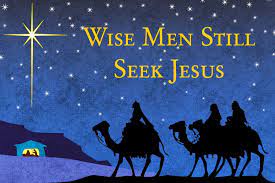Sunday Gospel, January 2, 2022:
Mt 2:1-12
When Jesus was born in Bethlehem of Judea,
in the days of King Herod,
behold, magi from the east arrived in Jerusalem, saying,
“Where is the newborn king of the Jews?
We saw his star at its rising
and have come to do him homage.”
When King Herod heard this,
he was greatly troubled,
and all Jerusalem with him.
Assembling all the chief priests and the scribes of the people,
He inquired of them where the Christ was to be born.
They said to him, “In Bethlehem of Judea,
for thus it has been written through the prophet:
And you, Bethlehem, land of Judah,
are by no means least among the rulers of Judah;
since from you shall come a ruler,
who is to shepherd my people Israel.”
Then Herod called the magi secretly
and ascertained from them the time of the star’s appearance.
He sent them to Bethlehem and said,
“Go and search diligently for the child.
When you have found him, bring me word,
that I too may go and do him homage.”
After their audience with the king they set out.
And behold, the star that they had seen at its rising preceded them,
until it came and stopped over the place where the child was.
They were overjoyed at seeing the star,
and on entering the house
they saw the child with Mary his mother.
They prostrated themselves and did him homage.
Then they opened their treasures
and offered him gifts of gold, frankincense, and myrrh.
And having been warned in a dream not to return to Herod,
they departed for their country by another way.
Bishop Barron:
Friends, the Gospel for the feast of the Epiphany contains some elemental theological themes. One of them has to do with the relation between Christianity and the nations.
We hear something extraordinary. Magi from the East left their home country in search of a newborn king whose star they had observed at its rising. Why, precisely, would people leave their own country in order to worship a foreign king at his birth?
So this odd story should get our attention. Magi—kings, astrologers—seek out a foreign king who somehow, nevertheless, belongs to them. We’re actually coming close to the heart of the biblical revelation. Of all the nations of the world, God chose to make of Israel a beacon to the world, so that through Israel all might be gathered.
Yes, a king would be born for the Jews, but he wouldn’t be for the Jews alone. This Messiah would be the King of kings, a light to all the nations. The Messiah, therefore, would represent the overcoming of the nations, the transcendence of the disputes between peoples and cultures that had so tragically marked human history, and the opening up of a new possibility.


Recent Comments